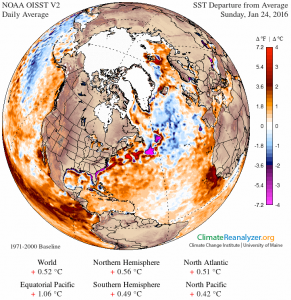The first post in this series gave the basic summary of Marvel et al (2015) (henceforth MEA15) and why I think it is an important paper. The second discussed some of the risible immediate media coverage. But there has also been an ‘appraisal’ of the paper by Nic Lewis that has appeared in no fewer than three other climate blogs (you can guess which). This is a response to the more interesting of his points.
[Read more…] about Marvel et al (2015) Part III: Response to Nic Lewis
References
- K. Marvel, G.A. Schmidt, R.L. Miller, and L.S. Nazarenko, "Implications for climate sensitivity from the response to individual forcings", Nature Climate Change, vol. 6, pp. 386-389, 2015. http://dx.doi.org/10.1038/nclimate2888
